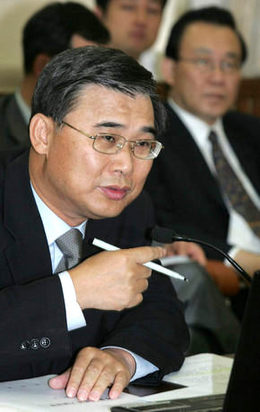 |
Man behind South’s N.K. policy up against a number of critics
The face of Unification Minister Lee Jong-seok looked fatigued as he held a regularly scheduled briefing on July 20. An aide of the minister said that Lee "had not slept and stepped out before dawn." The day before, North Korea said that it would cancel a video reunion of separated families scheduled for August 15 as well as the construction of a reunion center at Mount Geumgang. In addition, recent inter-Korean ministerial talks had ended in failure.
On July 21, Lee said at a breakfast meeting organized by a civic group that his ministry, "rather than getting confused, will withstand all hardships as pine trees rather than grass." His remark was seen as a willingness to push for a breakthrough with the North, even amid public criticism over the government’s North Korea policy.
In official and unofficial meetings with unification ministry officials, Minister Lee has expressed such thinking. He has been said to make no unconditional concessions to North Korea, nor easily accept sanctions against North Korea proposed by neighboring countries. So to speak, Minister Lee’s mind seems to see things on another level. "The road is something no one chooses, so we must endure," is a quote attributed to him. He has also said it would be easier to work with one side only, but that that is not the position he will take to get out of the current situation.
Minister Lee’s methods are based on his attempts to keep in check hawkish forces in the United States and North Korea, while trying to support reconciliation as the goal of his position. Some have criticized this method as impractical, which is perhaps the reason Minister Lee has relentlessly stuck to his methodology. With regard to some critics, who say that he exploits South Korea’s rice and fertilizer aid to the North as a strategic tool, he argued following the North’s missile tests that "we can’t give something in exchange for nothing." Regarding an alleged rift in the South Korea-U.S. alliance, Lee stressed that "the South Korean government has something to say to the U.S. in terms of North Korean affairs."
Since the premature demise of the 19th inter-Korean ministerial talks on July 13, Minister Lee has only spoken to the media four times, including a July 14 interview on MBC radio, a 100-minute discussion forum at MBC on July 20 and the SBS program "Sunday Click of Han Su-jin" on July 23. A government official said, "Frankly speaking, who is willing to undertake such an extremely difficult job under the current circumstances?" Calls to sack Minister Lee are being lobbed mainly from the opposition parties, but chances are slim for them to be answered. President Roh Moo-hyun was believed to have met Minister Lee on July 20 to discuss the presidential office’s countermeasures toward North Korea after the president presided over a security meeting with related ministers on July 19. However, it is unclear whether Minister Lee’s strategy will turn the tide in recently worsening inter-Korean relations. Herein lies the government’s agony.






